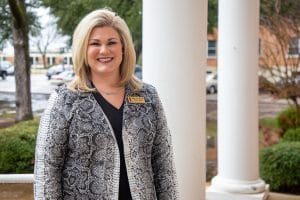Whitney Gass, assistant professor of criminal justice at Southern Arkansas University and a Governor’s appointee to the Arkansas Board of Corrections, had an “eye-opening” experience attending the American Correctional Association Conference in San Diego, Calif., Jan. 10-14.
“Each facility up for reaccreditation submitted a packet including an audit performed by a certified ACA auditor,” she said. “The purpose is to ensure the safety of all inmates, staff and administrators associated with their facilities.” She was proud of the success of Arkansas’ three ACA-accredited agencies.
Attending the national conference was a great opportunity for Gass “to learn more about the vast machine that is American Corrections from the association that has championed correctional effectiveness for almost 150 years,” said Dr. Deborah Wilson, chair of the Behavioral and Social Sciences Department at SAU. For Gass, it was a chance to learn from professionals in the field and researchers who have dedicated their lives’ work making correctional institutions better and more effective.
“One of the most interesting sessions I attended was the accreditation hearing for the three agencies in our state,” Gass said. “It was my first time meeting some of the staff members and administrators of those institutions. It was an eye-opening opportunity. I learned a lot about corrections in general but also the hard work these professionals do every day.”
The conference offered presentations, workshops, and professional development regarding prison education, healthcare in prisons, security, trauma, reentry, drug abuse, and many other topics.
“I attended several sessions but one of the most enlightening was entitled ‘Better Understanding Trauma, Abuse and Invisible Suffering Experienced by Men,’” Gass said. “We talk and read about trauma experienced by women and children, but some of those children are boys and one thing we have failed to embrace is that traumatized young boys grow up to be men who’ve never dealt with or received help healing.” The session was led by a man who had experienced an inordinate amount of trauma with the first event starting around age 7. As a result, he developed addictions, failed in his relationships, and experienced many dark days. “This shed new light on the incarcerated and how recidivism might be reduced if we encourage more men to dig deep and acknowledge the ways they’ve been hurt even if it happened when they were 5 years old,” she shared.
Prison can be a horrible experience but also a time for education, recovery, and more. “This conference was academically beneficial because I’ll be able to share much of what I learned – the importance of professionalism, honesty, integrity, teamwork, communication,” Gass explained.

